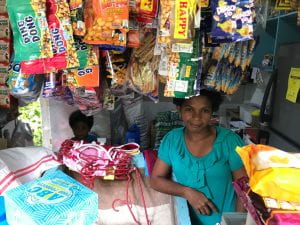 Kabuhayan Para sa Magulang ng Batang Manggagawa (KASAMA) is an important piece of the Government of the Philippines effort to eliminate child labor. For this study, the Philippine Department of Labor and Employment (DOLE) partnered with IPA-Philippines in an evaluation of KASAMA across 164 communities and 2,296 households where child labor is prevalent. KASAMA provides a one-time USD\$518 in-kind asset transfer (selected by the beneficiary) and 3 days of training related to operating a business and child labor. Funding for this research was provided by the United States Department of Labor under Cooperative Agreement IL-27208.
Kabuhayan Para sa Magulang ng Batang Manggagawa (KASAMA) is an important piece of the Government of the Philippines effort to eliminate child labor. For this study, the Philippine Department of Labor and Employment (DOLE) partnered with IPA-Philippines in an evaluation of KASAMA across 164 communities and 2,296 households where child labor is prevalent. KASAMA provides a one-time USD\$518 in-kind asset transfer (selected by the beneficiary) and 3 days of training related to operating a business and child labor. Funding for this research was provided by the United States Department of Labor under Cooperative Agreement IL-27208.
Study Summary
- Do Asset Transfer Programs Lead to Child Labor? VoxDev, 11/20/20
- Reducing Child Labor in the Philippines, Innovations for Poverty Action, October 2018
- On-line version
Completed Working Papers
- Technical Appendix
- Accepted Stage 1 Version
- The Stage 1 Review process at the Journal of Development Economics is a peer review of the proposed study before the results are available. More information is available here and here.
- When referee or editor instruction from the Stage 1 review process directed us to do something different than specified in our AEA registered analysis plan, our final paper follows the directions from the Stage 1 review.
- Replication files
Work in Progress
- Parenting Adolescents (with Caroline Theoharides)
- Social Stigma and the Sensitivity of Child Labor Questions (with Caroline Theoharides)
Documentation
AEA Analysis Plan
- File Registered on March 25, 2016
- Confirmation of Registry
- Extract of Key Variable Definitions (internal references are for the baseline survey only)
Baseline
Midline
Endline
Questionnaires
Data
- The do files contained in this link are all directed at generating the Final Report linked above. They differ from the replication files for the academic papers because of funder interests.
- Please contact Eric Edmonds before beginning any project with this data to avoid redundancies with other authors working with this data.
- Please cite “The Short Term Impact of a Productive Asset Transfer in Families with Child Labor: Experimental Evidence from the Philippines” as the source of this data when working with this data.